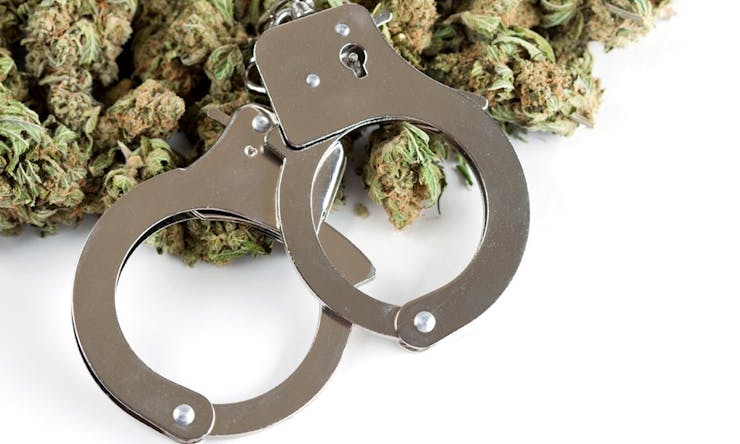The number of cannabis industry conferences seems to grow exponentially every year, but the Reform conference remains the premiere get-together for global policy makers and industry shakers. This year’s shindig is no exception. Today’s opening session at the Crystal Gateway Marriott hotel in Arlington, Virginia, was salted with officials from Jamaica, Uruguay, Mexico, and a gleeful contingent from Canada.
Between panels, America’s legalization brain trust could be seen hobnobbing: Marijuana Policy Project leader Rob Kampia and organizer Mason Tvert; Washington State legalizer Alison Holcomb; New Approach founder Graham Boyd; Jasmine Tyler, drug policy reformer for George Soros’ Open Society Foundations; Denver legal eagle Brian Vicente; former ACLU head Ira Glasser; Oregon Rep. Earl Blumenauer (rocking a pink bow tie); New York Rep. Hakeem Jeffries; Brookings Institute fellow John Hudak; and even former Responsible Ohio director Ian James, showing up to take his lumps over the debacle of Issue 3.
With such an all-star cast, there was a lot going on; here are Leafly’s top level takeaways.
DPA Reform Conference Day One: Ending ‘End the War on Drugs’?
“Years ago we were fighting for incremental change on medical marijuana laws. Now we’re talking about ending marijuana prohibition entirely.” That’s how Ethan Nadelmann summed up the progress he’s seen over the past 15 years as executive director of the Drug Policy Alliance (DPA), one of the nation’s most influential drug law reform groups. Nadelmann, the former Princeton professor who famously gave up tenure to fight for legal change, basked in the movement’s success before 1,400 attendees from 71 countries at the International Drug Policy Reform Conference, a global meetup organized every two years by the DPA.
“For twenty years we’ve said ‘End the War on Drugs,’” Nadelmann told the crowd. With that war now winding down, and with a majority of Americans considering the war a failure, “we ask ourselves: Do we need a new phrase?”
New Answers to an Old Question
The question gets asked at every conference: When will the federal government fully legalize cannabis? The answer from the experts in 2015: Don’t hold your breath. Ben Pollara, who managed Florida’s 2014 medical marijuana campaign (you remember, the one that got 58 percent of the vote and lost), said he didn’t consider national legalization inevitable. “Nothing in life and politics is inevitable,” he said, “and certainly not this.”
“It might be a while before we see legalization forced upon a state that doesn’t want it,” said Matt Schweich, director of state campaigns for the Marijuana Policy Project (MPP). Dave Metz, an Oakland-based political pollster, said his data indicated a changing belief among voters. “Voters now believe legalization is inevitable, even if they’re not all ready to vote for it,” he said. “They understand that’s where the momentum is going.”
One thing that will help, said Metz: The post-2016 experience. With four or five states, including California, potentially turning legal in the November 2016 election, “people nationally will see the economic benefits and the lack of public safety problems. That will put a lot of pressure on other states.”
Is Presidential Turnout Necessary?
In 2013, one of the political truisms floating around this conference was the Four Year Rule. There was a widespread belief that cannabis legalization measures could only be passed during presidential elections, because of the heavy turnout from younger voters.
Two years later that’s no longer the rule. Oregon, Alaska, and Washington D.C. legalized in 2014. Ohio lost in 2015 for reasons completely unrelated to young voter turnout. In fact, some now believe that the marijuana measure itself can drive turnout as much as a presidential ballot.
John Hudak, a fellow at the Brookings Institute who covers cannabis issues, recently dug into the numbers produced by the Washington State and Colorado elections in 2014. “Compared to 2008, you’d expect a marginal dropoff in the youth and liberal vote, based on the Obama effect,” he said. In other words, the possibility of electing Obama was exciting the first time around, not so much the second. “But in Washington State, voters age 18-29 doubled from 2008 to 2014,” when a legalization initiative was on the ballot. “In Colorado, it was up 80 percent.”
“There’s this odd dynamic,” Hudak said. “The presidential election has an effect on the marijuana issue, but the marijuana issue also has an effect on the presidential election.”
Ben Pollara said he saw something similar happen with Florida’s medical marijuana vote in 2014. “The number of first-time voters doubled from 2010 to 2014,” he said. “The youth vote — 18 to 29 year-olds — nearly doubled.”
New rule: Run a cannabis legalization measure in any November election. But run a good one. We’re looking at you, Ohio.
Quick Hits From the Floor
“Don’t underestimate the influence of Canada. If they legalize, it could have a huge effect here,” said Washington Post writer Christopher Ingraham.
”I’m less worried about Chris Christie,” said Marijuana Policy Project director Rob Kampia. “If Bernie Sanders or Rand Paul wins, I could see big changes coming. If not, then I foresee small tweakings. The Cole Memo would be renewed, but other than that I don’t see much change from a new administration.”
”They may not care about it now, but I think the presidential candidates are going to care about marijuana as an issue once they realize they’re going to be alongside it on the ballot,” said Florida medical marijuana campaign director Ben Pollara.
”Mr. President, I love you like a father for commuting my sentence, but with all due respect, you need to do more,” said Jason Hernandez, whose drug sentence was commuted by President Obama earlier this year.





